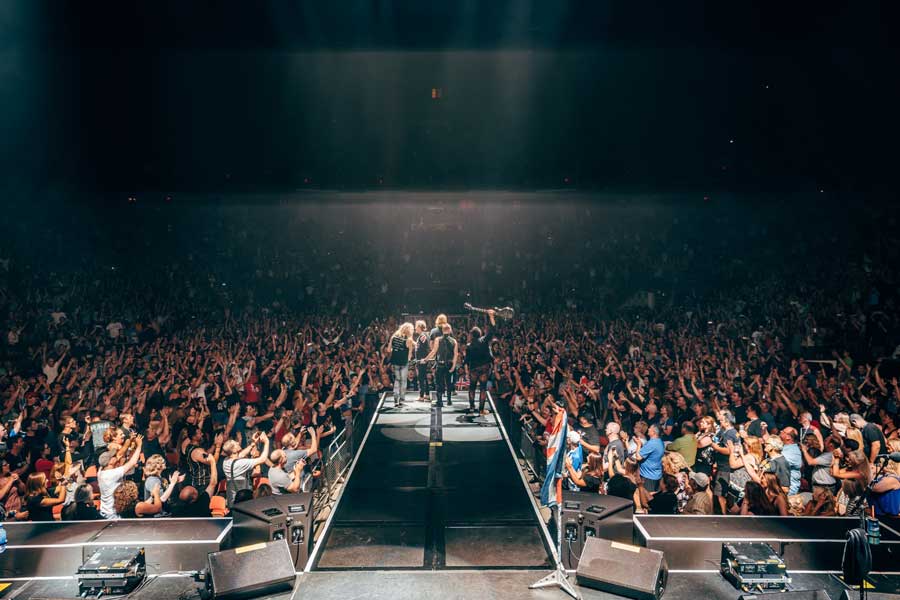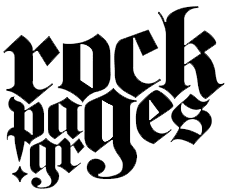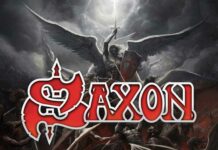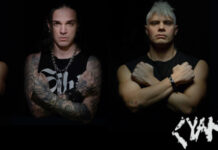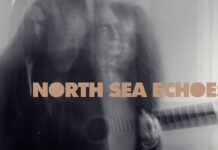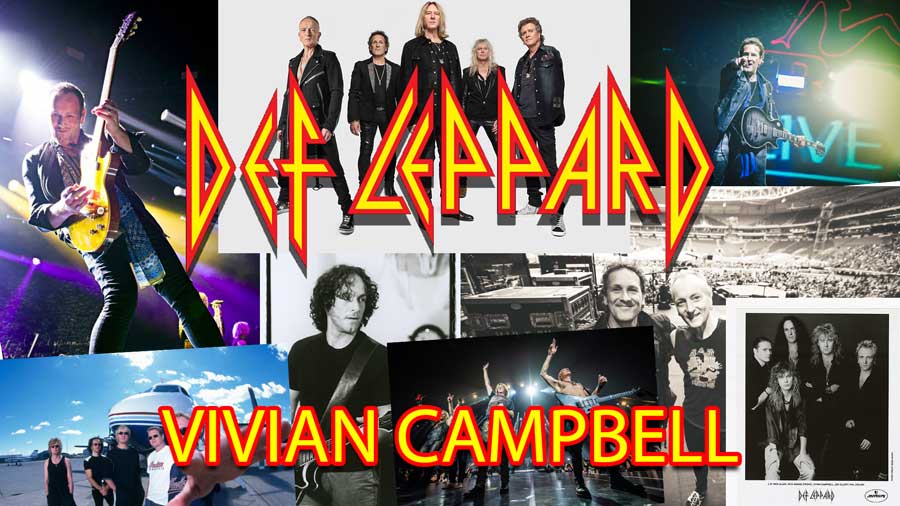
Def Leppard fans are special but most importantly patient people. You see we had gotten so used in big gaps between albums by our favorite band that the new album, “Diamond Star Halos” seems genuinely a huge event…and it truly is! Especially, given that it’s such a remarkable and diverse album. Naturally, we wouldn’t miss the chance of getting in touch with them for all the details. This time around, Vivian Campbell was available and he was more than happy to shed more light to the overall making of the new record. By the way, 2022 marks the 30th anniversary of Viv’s presence in Def Leppard…and he’s still the new member!
Interview: Sakis Nikas Editing/Post Production: OneManArmy
Rockpages.gr: You had to work on the whole album remotely, how was that experience?
Vivian Campbell: Good and bad. Mostly good. You know, out of necessity, we couldn’t get together so…Let me touch on the bad part first. The bad part, and this is only for me personally, is that I am not very good with technology. So I didn’t have any sort of recording setup at home. I wasn’t prepared for this record at all. I was prepared to go on tour in summer of 2020 and then all of a sudden everything changed and we were making a record. So I had a lot of panic. I had to call a lot of clever, grown up friends who understand technology. And I said, I need to record what I need. So I had to get an interface. So there was a very rapid and very steep learning curve for me to. Get over this and (then) what? But once I got over that, I mean, I can’t say that I got good at that. I didn’t even get to the stage where I could edit anything. I would just record whole parts and then multiple times like guitar parts, I would record maybe five, six, seven guitar solos, you know, very similar. You know, I would send them all to our engineer/producer Ronan (McHugh) who’s in Dublin. And Ronan was a very clever person who put it all together.
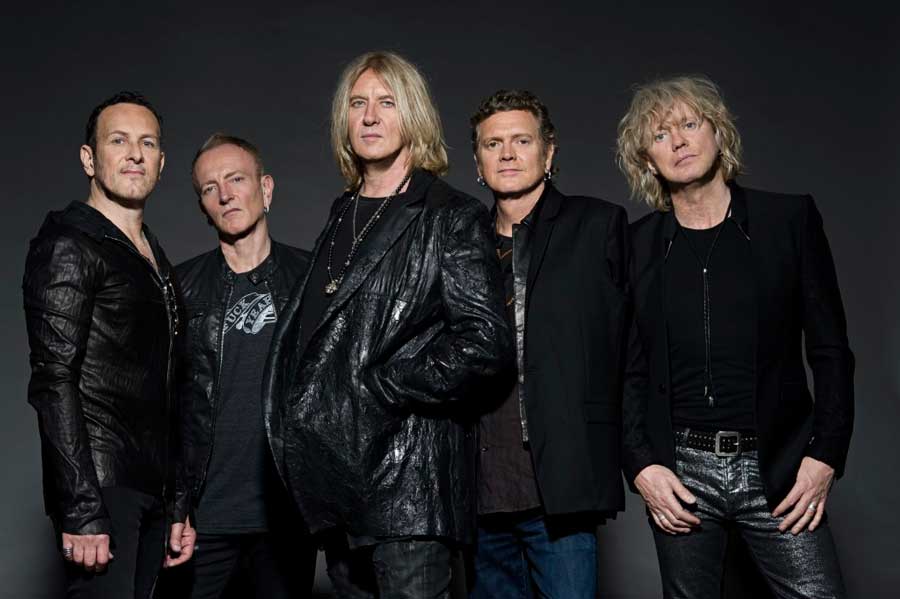
And when it came time to do a session like a vocal or a guitar part, Ronan would send the session to me. I was working in Logic Pro because Phil told me that’s what he was using. He said: “Oh, don’t worry about it. It’s really easy to use”. So I got it. And I’m looking at it. I’m thinking: “I don’t know how to work this”. So it’s just it’s been a long, long time since I had a home studio of my own. It was back in 2009 was the last time I had a Pro-Tools home studio, and I’ve moved multiple, multiple times since then and any equipment I had is still in boxes and ProTools has become something different and I’ve just fallen out of that whole process of being able to record demos. So anyway, but once I got over the technical hurdles and managed to get a vocal sound and a guitar sound into the computer, it was actually good to work on my own because there is no pressure.
There’s no one looking over your shoulder, there is no time constraints. And because nobody knew we were making a record, it was very, very casual. We had no deadline, we had no schedule. So, you know, every morning I would wake up, I would go to the drop box and there’d be another session, a song from Joe or a song from Phil. And I download it and I’d listen to it and I’d think, okay, I need to live with this well, but there was no one calling me and saying: “Hey, we need those parts, you know, hurry up, hurry up”. So it was just really, really easy. So in that regard. In particular to the guitar parts. It was very easy for me to play a little and get a sound. Think about the part, the chord, something, listen to it and think, you know, it’s good, but it’s not 100% yet. And then I just I’d go to take my dog for a walk or go drive my car and come back and, you know, try it again until I got it to where I thought, okay, that’s pretty good. I like that. And then, like I said, I didn’t know how to edit anything, so I, I just (had) to make sure that I had a really, really good performance or enough to make a really good performance. I would do it four or five or six times and send it to him and let him, you know, do something magic with it
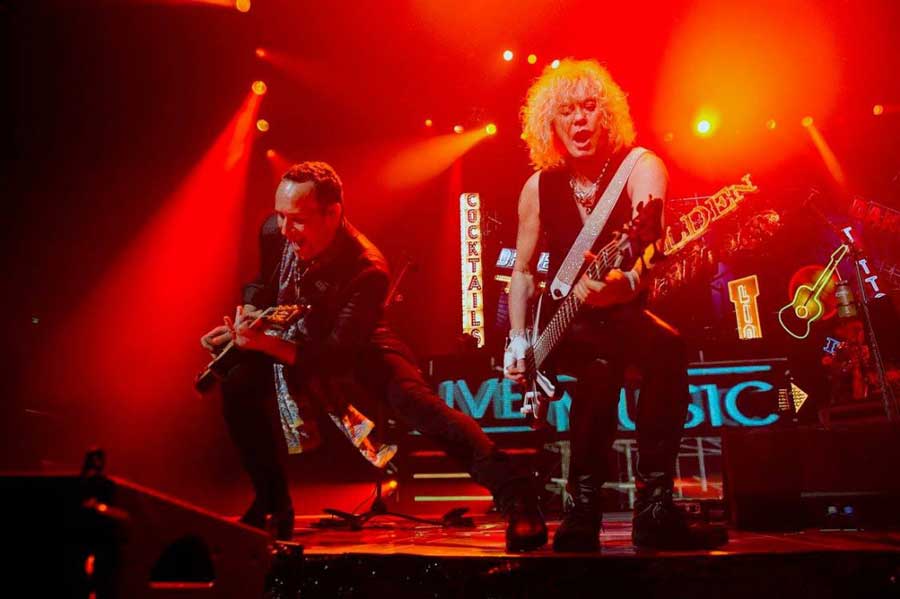
Rockpages.gr: Did you miss the recording process of a jam with the other guys?
Vivian Campbell: Def Leppard has never had that kind of recording process, even if we were all in the same room. We don’t do it like that. The last time we played live together in the studio for an album was in “Slang” in the 1990s. We just…we always work (like this). (Def Leppard) is a very, very unique band in many, many ways, and especially in the studio. The process is always, always one person at a time. Even if…even if all five of us are in the room, it’s always just one guy doing that. And that’s where the pressure part comes in. You know, it’s like, I’m doing it. I’m thinking, okay, well, you know, I’ve got to finish this because everyone’s hungry and wants lunch, you know, so or whereas when we worked alone, you know, there’s none of that pressure. For certain bands like with Last in Line, for example, we need to be in the room together because we’re just that old-school kind of band when it comes to recording the backing tracks for Last in Line. We need to see each other. We need to make eye contact because there’s just…it’s a very loose sort of thing. I think what Leppard does is very structured. It’s a different thing and it’s very finessed. It’s like a, like a fine oil painting, you know, where a last in line song is like graffiti written on a wall. You know, it’s just a different, different course, you know, for things. And making records that way allowed us to make this album thousands of miles away from each other.
Rockpages.gr: Phil and Joe characterized this album as “diverse”. Do you agree?
Vivian Campbell: Yeah. It is a very diverse record. I think that started…well, it started a long time ago, I think, at this stage in Def Leppard’s career…I think it’s fair to say that we’re no longer just a straightforward rock band. I mean, we’ve dabbled in many, many different kinds of musical genres over the years. It’s really difficult to classify what the Def Leppard sound is now. I mean, we’ve branched out so much over the years. You know, there were there were elements of sophistication and Def Leppard songs that go way, way, way beyond basic hard rock. But the result is, at the same time, there’s always that hard element that we bring even to the most sensitive or most straight up of pop songs. You know, we’re still rock musicians by nature. You know, when I plug my guitar into an amplifier, I’m still turning it up, you know, it’s just that’s just me. I can’t play, like, you know, delicately. I play with a lot of strength. And the same is true for Phil. And when we sing, you know, we’re committed. I guess there’s a level of commitment that makes us bring that rock element to whatever this genre of music is.
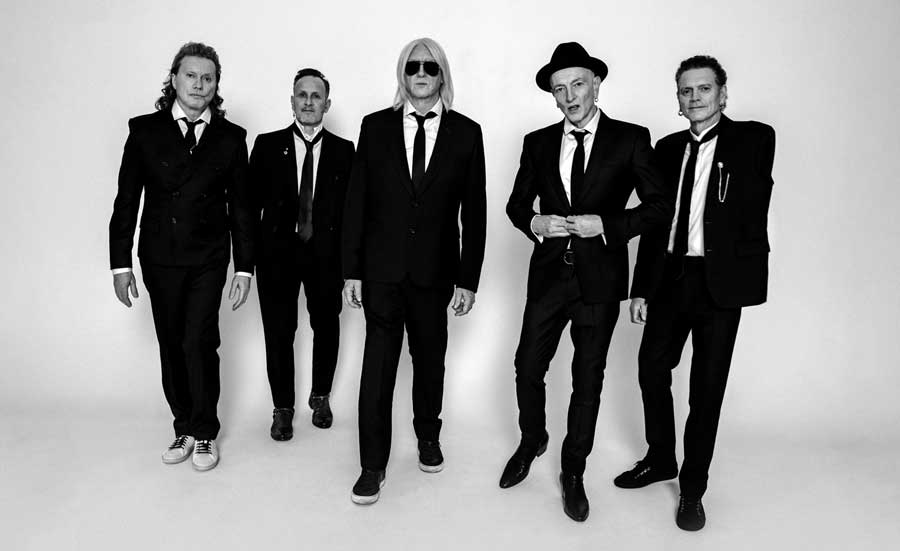
Rockpages.gr: “Take What You Want” has that classic Def Leppard sound. What do you think?
Vivian Campbell: That’s closer (to the Def Leppard classic sound) but it’s also a very, very sophisticated song. When you do the parts, the introduction part, and that happens again in the middle of the song where it breaks down, you know, that’s one of the best songs. It’s a sad song. I’ve got to say, it’s one of my favorite on the album. It is. And as is typical of a lot of sad songs, there is a level of sophistication to the writing. It’s not just a forward rock song, but that’s a big Queen influence, you know, and it’s got swooping vocals everywhere. And, you know, these are our influences growing up. I mean, Queen were a huge influence on all of us, in particular on Sav, you know, and it’s often been said that and it’s a very accurate way to sum up…Def Leppard. It’s as if, you know, Queen meets AC DC, you know, like AC DC is real basic. This elemental hard rock…Queen is this really sophisticated, swirly artistic band. And you put the two together and that’s Def Leppard, you know, those are big, big influences for us.
Rockpages.gr: “Kick”, the first single of the album sounds like a T.Rex song. Do you agree?
Vivian Campbell: So that’s, it’s a very typical Def Leppard song like. Yeah. It is. Yeah, it’s very, very elemental, a very classic rock and fun and pop at the same time. Yeah, it’s got a bit of the glam rock thing. We all came out of age musically in the early seventies and, you know, David Bowie and Marc Bolan and that whole glam rock era…Sweet…You know, the songs of Chin and Chapman, you know? Catchy hooks. I mean…Yeah.

At an early point of the record, we were we never spoke to each other because we were all in different time zones. But we would email to each other, you know, we’d hear the stuff on the drop box and we’d email back and forth and make suggestions and comments. But one of the comments that came up early and repeatedly during the making of this record was how the whole album was reminding us of the 1970s in some ways. And but that wasn’t a conscious thing on our behalf. We didn’t set out to make a record that sounds like 1973. You know, obviously this is part of our influence, and it came out in the record.
Rockpages.gr: How come you didn’t write any songs on the new album?
Vivian Campbell: I just wasn’t prepared. I thought we were going on tour. And like I said, I don’t have a home studio. This is my home studio, my iPhone, you know! So I keep ideas in it, but I’ve never gone to the next level. And when all of a sudden we were making a record, I just had to learn how to record. And the songs came in thick and there were so many of these 15 songs on this record. I mean, so it’s not like we were short of songs if we had seven songs and all of a sudden I’m like, Guys, we need more songs to finish an album. Then I would have gone to my iPhone and said, Okay, yeah, I got this, let’s try and mix it. But it was just coming in thick and fast. I just wasn’t prepared for the record, to be honest, but I don’t think it’s a bad record as a result. I mean, the songs are great. There’s 15 of them and it covers a lot of different musical spectrums. I think we’re good. So having said that, I do feel bad because I, you know, I feel like I just wasn’t prepared. I didn’t do my homework.
Rockpages.gr: Should the fans expect any surprises on the Stadium tour?
Vivian Campbell: Yeah. We we’re very excited about the new record. We’re very excited about the response to it from press, from radio, from our record company, even if it’s the first record that we’ve done in a long time with a major record label again, and the record label is genuinely enthusiastic. I mean, we’ve been doing this long enough to know when the record company executives are disinterested, you know, or whether they’re genuinely enthusiastic. And we feel that enthusiasm is very genuine for this record. So we were very encouraged by that. And we are going to feature this new record quite prominently on the tour. So that’s something that in this day and age doesn’t happen a lot, you know, because new music doesn’t normally lead the charge on a tour anymore. It used to back in the 1980s. But it’s been a long time since that’s happened. But we really feel that there’s enough strength in this record and loose enough strength in what surrounds it, that we can be bold and lead with it.
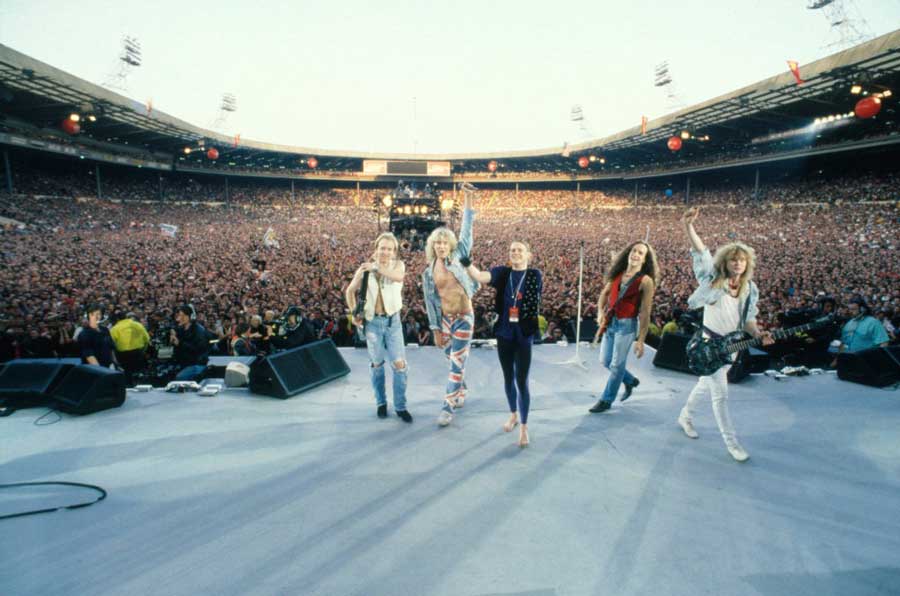
Rockpages.gr: Is Europe next on the Stadium tour?
Vivian Campbell: We’re going to do that. I hope so. I’ve heard talk that maybe next year that we could go overseas. But I don’t know if overseas means Europe or South America or Japan, Australia. But yeah, there’s been a lot of interest and even before COVID in 2020, when the tour was supposed to happen, there’s been a lot of interest. And in exploring the idea of taking that package with Def Leppard, Motley Crue and Poison, whoever, you know, this sort of like a mini festival, the travel, you know, and to take it overseas.
Rockpages.gr: Which overlooked song from your back catalogue you’d like Def Leppard to play live?
Vivian Campbell: Well, a couple of things. Number one, there’s a lot of songs in that catalog, but we have actually played an awful lot of them. I mean, we’ve played…particularly because we’ve done two Vegas..Las Vegas residencies. And that’s always the place where you get to really go crazy with the setlist because you know that people are going to fly to Las Vegas from all over the world. They’re going to be really hardcore fans. They’re going to want something different. You know, they don’t just want “Pour some sugar on me”. They want to hear, you know, “Lady Strange” or something bizarre. So we had, you know, last time that our Las Vegas residency was summer of 2019. You know, we were playing songs like “Die Hard The Hunter” and “Billy’s Got A Gun”. And it was great because we had to go back and learn this. And there’s lots of guitar parts, you know, all that. And I always enjoy that.
But no, I to be honest, I can’t think of any particular song off my mind. I mean, I maybe if I went back and I looked at a list and I’d say, Oh, that one. But yeah, we’ve touched on a lot of stuff over the years.
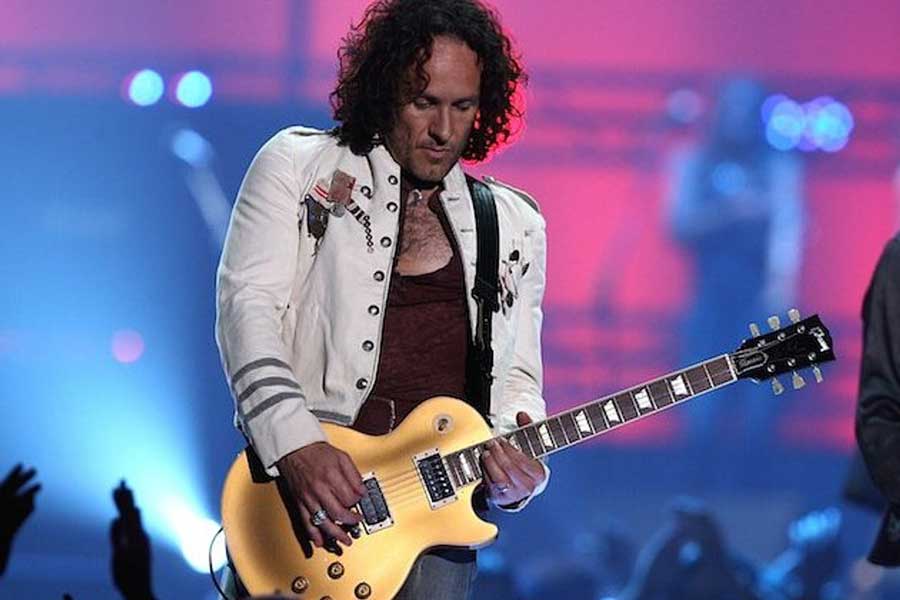
Rockpages.gr: Although you’ve been in the band for 30 years you are still “the new guy”…
Vivian Campbell: Well, I hope to always be the new guy, you know, and that is something unique because those, you know, so many of our peers. From those days from the early 1980s. I mean, so many of them are not alive anymore. So many of them…so many bands have fallen apart or retired or have just completely different lineups. So there’s a lot to be said about the stability of Def Leppard, and that’s something that we aim to keep.
Rockpages.gr: Mutt Lange is still active, how come you don’t work with him again?
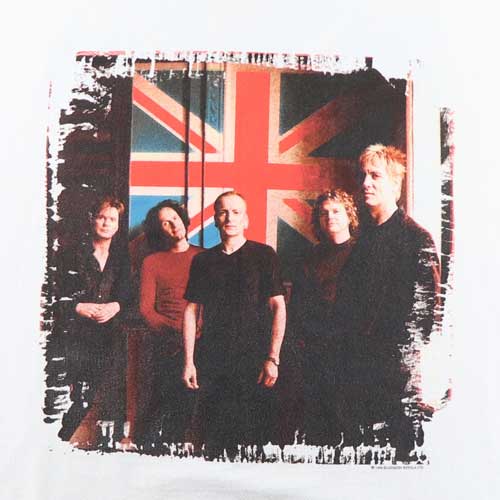
Vivian Campbell: That’s…I wish I had an answer. I would love to. I mean, we worked briefly with Mutt on “Euphoria” and it was just unbelievable. I totally agree. The guy is a genius. He’s the most talented person I’ve ever met in music business. And not just by a little…by a lot! You know, Oh, I’d love to (work with him again). I’m sure we’d all love to. I. I don’t know why. You know, it’s just hasn’t lined up yet, you know…
Rockpages.gr: It’s been 17 years since you released your first solo album, do you consider releasing another one?
Vivian Campbell: So, maybe some time in the future, hopefully the time will be right. And we’ll do that again. It has to get beyond my iPhone to do. Yeah, I know. Yes. Would be the short answer. But in reality, I mean, working with Def Leppard and working with Last in Line…you know, that keeps me pretty busy. You know, many people have said, when COVID happened and everything sort of stopped, you know, a lot of people rethought how they’re living their lives. You know, for me, it really made me realize how busy I’d been for the last ten years or so, you know, because when I wasn’t working with Def Leppard, I was on the road with Last In Line and it was just constant, constant travel, home for a day, gone again. So I really appreciated having the time off and I got to do other things in my life, you know, that I’d always wanted to do. I really got into rally driving and, you know, racing with cars. But having said that, you know, now getting back to work. We’re in L.A. at the moment rehearsing for the tour with Def Leppard. And I go home for 12 days before between rehearsal and tour. And in those 12 days I need to record guitar solos for the new Last in Line record. So it’s again, it’s just there’s so much. So I would love to make another record, but I would need to technically get my shit together and I would need to take a big block of time. And I don’t know how to do that.
Rockpages.gr: If you had to pick one Def Leppard album you played on, which one would that be?
Vivian Campbell: I would go with the new one because I think it’s my best playing by far. I think it’s our best singing, too. I just I think, you know, musically we’ve all sort of gotten really good, which you would hope, you know, if you keep doing something long enough, you finesse it and you get better. But I think in terms of recording my guitar solos and parts on this record. As I said earlier, it was very relaxed because nobody was looking over my shoulder. I was very comfortable with it. You know, historically, I’ve never been that comfortable playing in the studio in front of people.
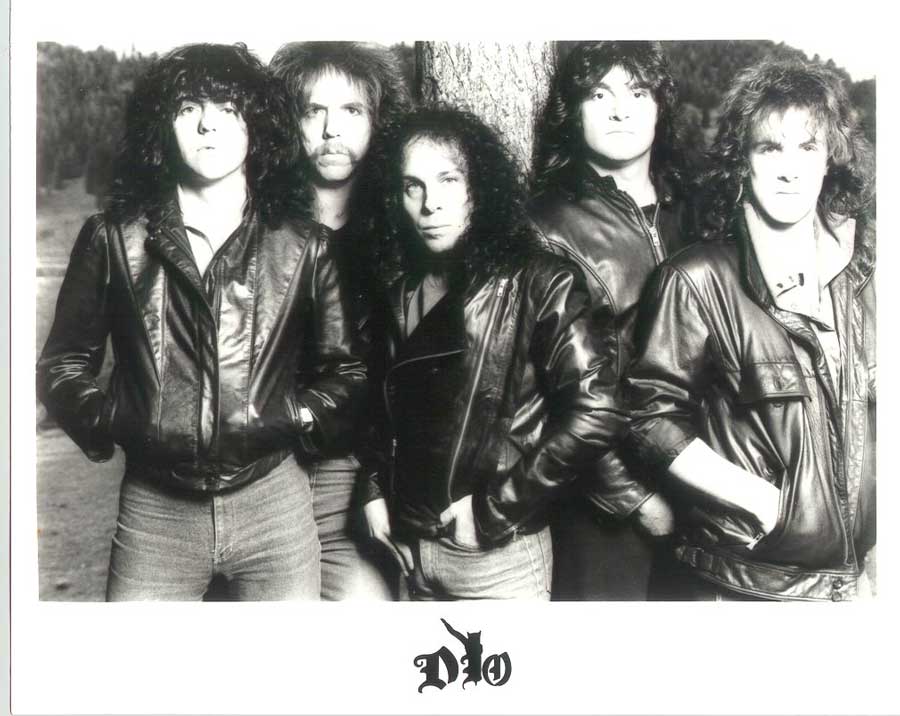
I mean, even long before Def Leppard when I first recorded with DIO, you know, Ronnie was in the studio, you know, and I felt that presence with me and it intimidated me a lot. On the “Holy Diver” album and then on the “Last In Line” album, I said to Ronnie and our engineer, Angelo, I said: “can you please go play pinball and let me record”? I mean, honestly, I did that. So they would set me up with a track -and this was before digital- It was the two-inch tape machine, you know, and so they’d set it up and I’d hit play and record, and I’d play a bit. And then if I liked it, if I got something I liked, I’d call them:“Hey, come on, come back in the studio”. They’d come in and go, “okay, yeah, We can work with that”. But that’s because I didn’t prepare for my guitar solos. I just thought, “okay, the song’s in E or A, I’m going to just practice and warm up and just be inspired in the moment. And it all goes back to the very first solo that I recorded for DIO.
On the “Holy Diver” album, “Rainbow in the Dark” was the first guitar solo. So, we we’d cut all the tracks. And Ronnie said to me the night before: “Tomorrow we’re going to start recording guitar solos. Which one do you want to start with? And I thought… errrr “Raibow In The Dark”, so, all day before recording that solo I was playing in A minor, A minor… because that’s the key of the song, just playing all day. But having not thinking to structure a solo, I don’t know why, you know… it never occurred to me that it would actually work to give myself a roadmap, so I’m just playing, playing, playing. And then that evening we get a guitar sound and Ronnie goes: “okay, let’s, let’s try one”. And the solo on the record is the first take. So I did the solo and Ronnie went: “Wow, so that was brilliant. Do you want to try another”? And I said, “Oh, okay…” although I didn’t want to try. And I was thinking, “well, what was wrong with that one?”, you know, (it) was right. So, then the second time I play it, I’m starting to think, okay, well I can’t start there because it started that I’ve got to go. So, it’s getting into my head now. So, I did one and it was just totally different and then Ronnie says, “okay, we just want to keep the first one. Let’s move on to another song”.
So, I think the problem was that instilled in me this false sense that that was how I should record guitar solos. And then it never quite happened that way. You know, sometimes you get lucky and sometimes more often than not, you know, it would be, “Oh shit, I’ve got to work something out”. Now, in this day and age, my thought process is totally different. I listen to the song, I listen, I listen, I listen, I listen…and I think in my head and I imagine what the guitar is doing and knowing how I play and thinking of parts, okay, I hear a melody going there. And so to have the luxury of time on this record on “Diamond Star Halos” to sit at home and just do that and then listen to it and think, ” that’s good, but the performance is not quite good enough”. I’m going to drive a car and come back tomorrow and do it again. And so that I would for that reason, I would say this record definitely has my best playing.
